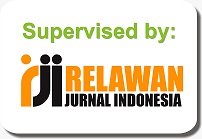The Effect of Emotional Intelligence on Students' Islamic Education Learning Outcomes
DOI:
https://doi.org/10.32939/tarbawi.v17i1.1000Keywords:
Emotional Intelligence, Islamic Education, Learning OutcomesAbstract
This research is motivated by the importance of student success in learning that is measured through learning outcomes. The reality shows that student learning outcomes in Islamic Education subjects are still low. Learning outcomes can be influenced by several factors, one of which is emotional intelligence. This study aims to determine the effect of emotional intelligence on student learning outcomes in Islamic Education subjects. This research is a quantitative approach by survey method. The population in this study was 40 students of the fifth grade at Sekolah Indonesia Johor Bahru, Malaysia. The total sampling technique selected that. The instrument in this research consisted of an emotional intelligence questionnaire and a learning outcome test. The data were analyzed using a simple linear regression test. Based on data analysis, it was found that emotional intelligence has a significant effect on student learning outcomes in Islamic Education subjects. Therefore, emotional intelligence needs to be honed from an early age because emotional intelligence is one of the axes of individual success in various aspects of life.
Downloads
References
Alvarez, N., Martos, M., & Extremera, N. (2020). A Meta-Analysis of the Relationship Between Emotional Intelligence and Academic Performance in Secondary Education: A Multi-Stream Comparison. Frontieers in Psychology, 11(1517), 1–11. https://doi.org/10.3389/fpsyg.2020.01517
Darmadi, (2017). Pengembangan Model Metode Pembelajaran dalam Dinamika Belajar Siswa. Yogyakarta: Deepublish.
Daud, F. (2012). Pengaruh Kecerdasan Emosional (EQ) Dan Motivasi Belajar Terhadap Hasil Belajar Biologi Siswa SMA 3 Negeri Kota Palopo. Jurnal Pendidikan Dan Pembelajaran Universitas Negeri Malang, 19(2), 243–255.
Dewi, S. (2020). Pengaruh Kecerdasan Emosional Terhadap Hasil Belajar Matematika SMAN Di Jakarta Timur. Fokus Ekonomi, 01(1), 86–97. http://stiepena.ac.id/wp-content/uploads/2012/11/pena-fokus-vol-4-no-2-40-45.pdf
Ebinagbome, M. E., & Nizam, D. I. (2016). The Impact of Emotional Intelligence on Student’s Academic Performance: International Journal of Accounting and Business Management, 4(1), 10–18. https://doi.org/10.24924/ijabm/2016.04/v4.iss1/10.18
Febrianti, L., & Rachmawati, L. (2018). Pengaruh Kecerdasan Emosional Dan Disiplin Belajar Terhadap Hasil Belajar Siswa Di SMA Negeri 3 Nganjuk. Jurnal Pendidikan Ekonomi (JUPE), 6(2), 69–75.
Gafur, A. (2012). Desain Pembelajaran. Penerbit Ombak: Yogyakarta
Goleman, D. (2015). Emotional Intelegence, Kecerdasan Emosional “Mengapa EI Lebih Penting dari IQ”. Terjemahan oleh T Hermaya. Jakarta: Gramedia Pustaka Utama Pendidikan Nasional.
Islami, A., Putra, A., Deswita, R., Rusliah, N., Matematika, S. P., Sumur, D., Kecamatan, J., Bukit, P., & Penuh, S. (2020). The effect of emotional intelligence on mathematical concepts understanding of junior high school students. MaPan : Jurnal Matematika Dan Pembelajaran, 8(1), 61–75.
Kurnia, H., & Wahono, J. (2021). Pengaruh Kecerdasan Emosional Terhadap Prestasi Belajar Pendidikan Pancasila Dan Kewarganegaraan Siswa SMA Negeri 5 Yogyakarta. Academy of Education Journal, 12(1), 82–97. https://doi.org/10.47200/aoej.v12i1.431
Mashar, R. (2011). Emosi Anak Usia Dini dan Strategi Pengembangannya. Jakarta:Kencana
Purnaningtyas, A., Sendratasik, J., Semarang, U. N., Suharto, S., Sendratasik, J., & Semarang, U. N. (2010). Pengaruh Kecerdasan Emosi Terhadap Prestasi Belajar Siswa Mata Pelajaran Seni Budaya Smp. Harmonia Journal of Arts Research and Education, 10(1). https://doi.org/10.15294/harmonia.v10i1.56
Rahmawati, K. P., Djaja, S., & Suyadi, B. (2017). Pengaruh Minat Belajar Dan Kecerdasan Emosional Terhadap Prestasi Belajar Siswa Kelas XI IPS SMA Negeri 1 Prajekan Kabupaten Bondowoso Tahun Ajaran 2016 / 2017. Jurnal Pendidikan Ekonomi: Jurnal Ilmiah Ilmu Pendidikan, Ilmu Ekonomi , Dan Ilmu Sosial, 11(2), 61–68. https://doi.org/10.19184/jpe.v11i2.6448
Sudjana, N. (2014). Penilaian Hasil Proses Belajar Mengajar. Bandung: PT. Remaja Rosdakarya.
Sulastri, T., Suryana, Y., & Hidayat, S. (2021). Pengaruh Kecerdasan Emosional terhadap Prestasi Belajar Matematika Siswa Kelas V Sekolah Dasar Negeri 1 Manonjaya. Pedadidaktika : Jurnal Ilmiah Pendidikan Guru Sekolah Dasar, 8(1), 156–165.
Sulistianingsih, P. (2016). Pengaruh Kecerdasan Emosional Dan Motivasi Belajar Terhadap Kemampuan Berpikir Kritis Matematika. JKPM, 02(01), 129–139.
Triatna, C., & Risma. (2008). EQ Power Panduan Meningkatkan Kecerdasan Emosional.. Bandung: Citra Praya
Uno, B. H.(2012). Perencanaan Pembelajaran. Jakarta: Bumi Aksara.
Utami, S. A., Damayanti, E., & Ismail, W. (2020). Pengaruh Kecerdasan Emosional Terhadap Hasil Belajar Biologi Peserta Didik. Psikoislamedia: Jurnal Psikologi, 05(01), 1–13. https://jurnal.ar-raniry.ac.id/index.php/Psikoislam/article/view/6138
Downloads
Published
Issue
Section
License
Copyright (c) 2021 Aprianda

This work is licensed under a Creative Commons Attribution-ShareAlike 4.0 International License.









